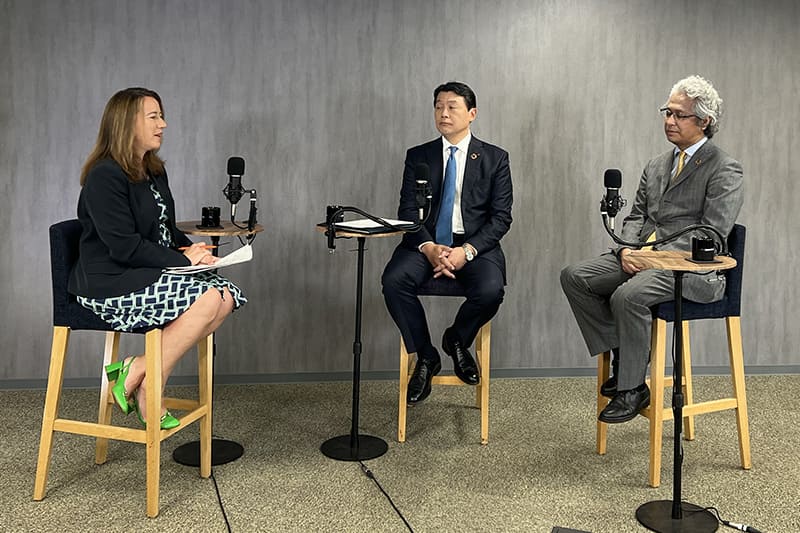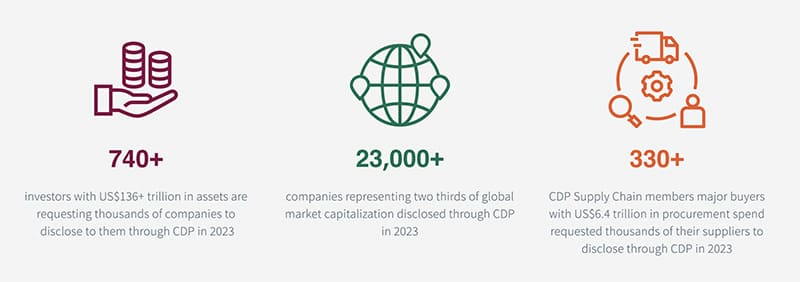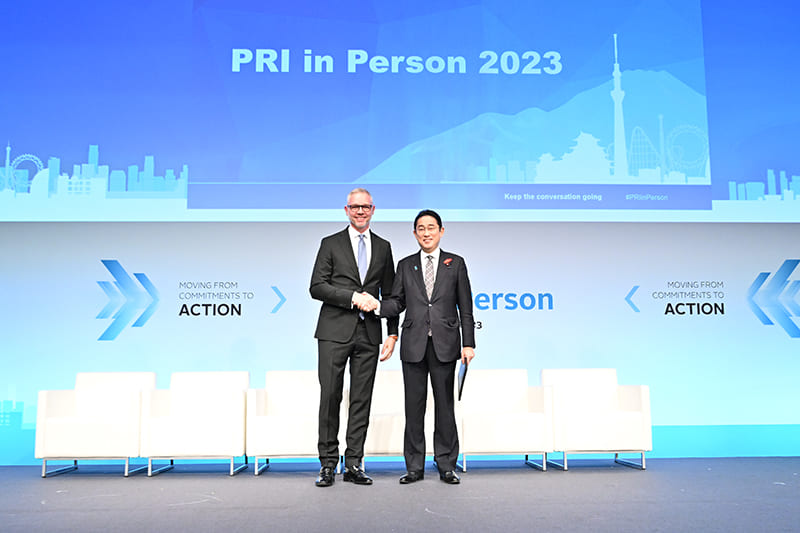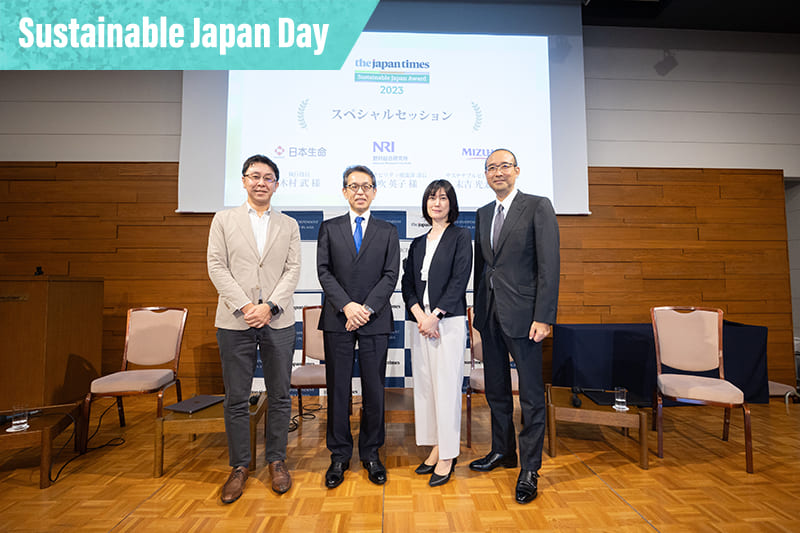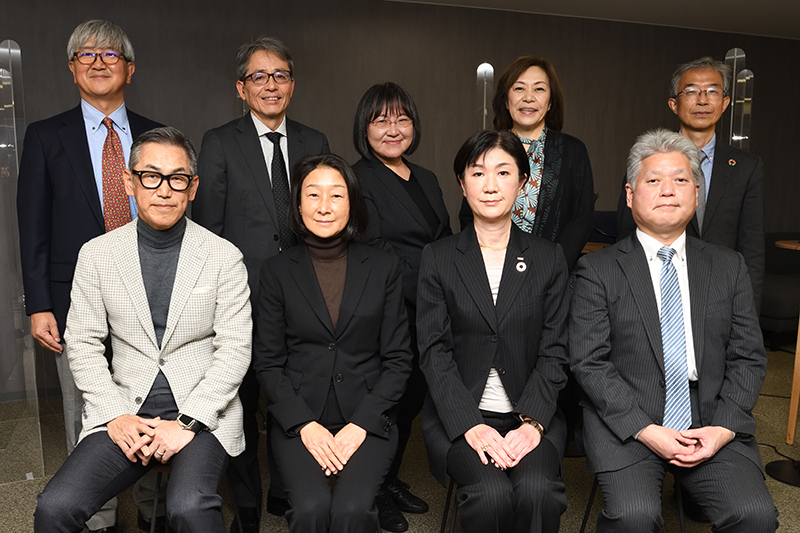April 19, 2024
CDP Awards Japan highlights successes, challenges
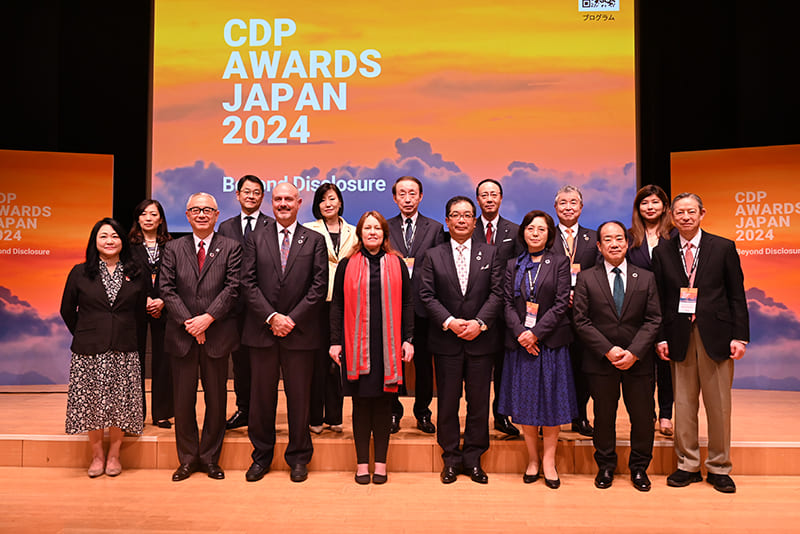
Amid a growing global sense of urgency on solving environmental issues, CDP Worldwide-Japan held the CDP Awards Japan 2024 on March 19 to highlight 127 Japanese companies and A List cities — the largest single-country total — that won top scores for their disclosure of information about climate, forests and water security.
CDP, a London-based nonprofit that runs the world’s biggest environmental disclosure system for companies, investors and governments, scored more than 23,000 companies across the globe in 2023 — a record number, and 24% more than the previous year. Out of these, about 2,000 are based in Japan.
A total of 112 Japanese firms made the A List for the climate change category, seven for forests and 36 for water security, with 24 scoring an A in two categories and two winning an A in all three, putting them among the 10 elite triple-A scorers worldwide.
“All of these are incredible achievements to be congratulated and celebrated,” CDP CEO Sherry Madera said in a video message. “Moreover, what’s behind them is the fact that the score represents a commitment to transparency, a commitment to sharing data and a commitment to using that data in order to be able to take climate positive actions.
“I think that our partnership together is going to be even more important as we drive for a better future and a more measurable, a more manageable, future that we can all take our data directly into action. What we’re doing is protecting not only today and tomorrow, but all of our future generations.”
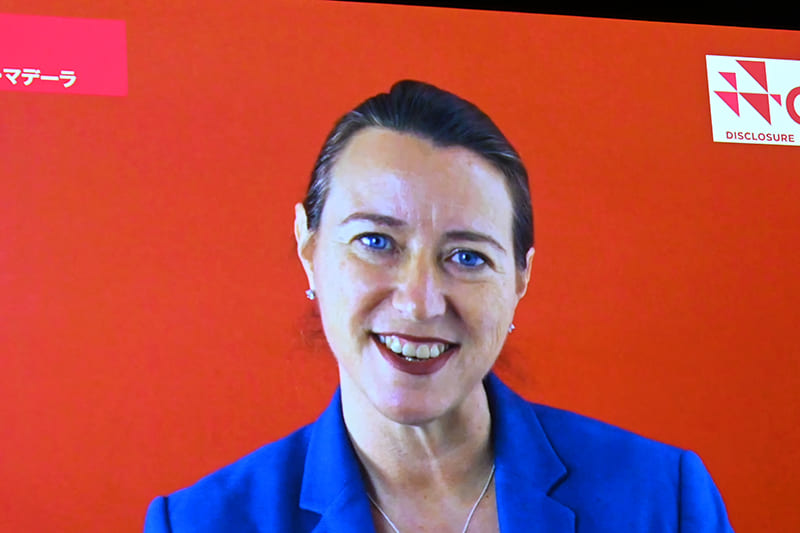
Sekisui House
Among the winners, Sekisui House, the world’s top housemaker, scored an A in all three categories — climate, forests and water security — for the first time.
“Since our global vision is ‘Make home the happiest place in the world,’ to realize the vision, Sekisui House believes it is essential to take action for the environment and sustainability,” Yoshihiro Nakai, president and CEO for Sekisui House, told the audience at the event. Established in 1960, the company has built more than 2.6 million houses in Japan, the United States, Australia and Singapore.
Nakai said the construction industry must contribute to reducing the consumption of energy and natural resources because, according to the United Nations Environment Programme (UNEP), nearly 40% of global carbon dioxide emissions come from the real estate sector.
Since 1999, when the company released its “Environmental Future Plan,” Sekisui House advanced its products and technologies to reduce carbon emissions until it developed net-zero-energy housing (ZEH), as the home construction business has a huge impact on Scope 3 emissions, the CEO said, referring to the emissions that occur in a company’s supply chain.
Despite initial difficulties in gaining understanding among customers, ZEH has spread in the housing market as its construction costs decrease. Currently, ZEH accounts for 93% of built-to-order houses, 100% of supplied housing and 70% of rental housing, Nakai said.
Sekisui also has promoted biodiversity through home gardens in its Gohon no Ki (“five trees”) project since 2001. With the slogan “three trees are for birds, two trees are for butterflies, and all are local native tree species,” the company has planted native trees in customers’ gardens, creating small natural ecosystems for birds and butterflies.
So far, the project has planted more than 19 million trees, with the potential to double the types of bird species and quintuple butterfly species in residential districts from 20 years ago, according to research carried out with the University of the Ryukyus, making it the world’s first quantitatively demonstrated example of urban biodiversity conservation, Nakai said.
He said that the approach has succeeded because of customers’ understanding over the past quarter-century and that the company has a huge impact because the home construction business uses as many as 10,000 products, supported by a large number of suppliers and artisans. “We will promote our steps upstream when we procure wood and other materials and go forward with all the downstream suppliers to realize a circular economy,” Nakai said.

Kao Corp.
Kao Corp. won a triple-A score in 2023 for the fourth consecutive year. “As a company that provides products to use in daily life, Kao is committed to pursuing the twin goals of improving and enriching the lives of the people that we serve and realizing a sustainable society,” David Muenz, director and managing executive officer in charge of ESG (environmental, social and governance issues) for Kao, said in his speech.
Kao, which produces a wide range of consumer goods such as detergents, soaps, toothpaste and cosmetics, has been proactive on climate change. In 2019, Kao developed its ESG strategy, the “Kirei Lifestyle Plan,” and started to promote its sustainability strategy under its midterm management plan, “K27,” in 2021.
The consumer goods maker pledges to achieve zero carbon emissions by 2040 and be carbon negative by 2050. “In 2023, we achieved 100% conversion of our purchased electricity to renewable energy in Japan,” Muenz said.
In Spain, Kao has constructed a chemical plant that uses thermal power generated from biomass from certified forest waste. It uses 95% less natural gas than comparable facilities and its major energy source, forest biomass, is 100% renewable and neutral in carbon emissions.
To reduce raw materials, Kao has developed much thinner bottle-type refill packaging that uses 40% less plastic. This has reduced carbon emissions in the packaging’s production, disposal and recycling, Muenz said.
“We will focus our efforts to ensure that our innovations are useful from upstream to downstream to help society as a whole to tackle climate change,” he said.
In the forest category, Kao aims to implement both environmental and social initiatives for forests that produce palm oil, one of the main raw materials for its laundry detergents, shampoos and other products. For 2023, it created a Palm Oil Dashboard on its website to show its activities related to palm oil procurement.
“Palm oil is one of Kao’s most important natural capitals, and we disclose our sustainable procurement policy, our medium- to long-term plans for solving issues, traceability, confirmation status, the latest map of mills, as well as the SMILE program to support independent small-scale plantation farmers in Indonesia,” Muenz said.
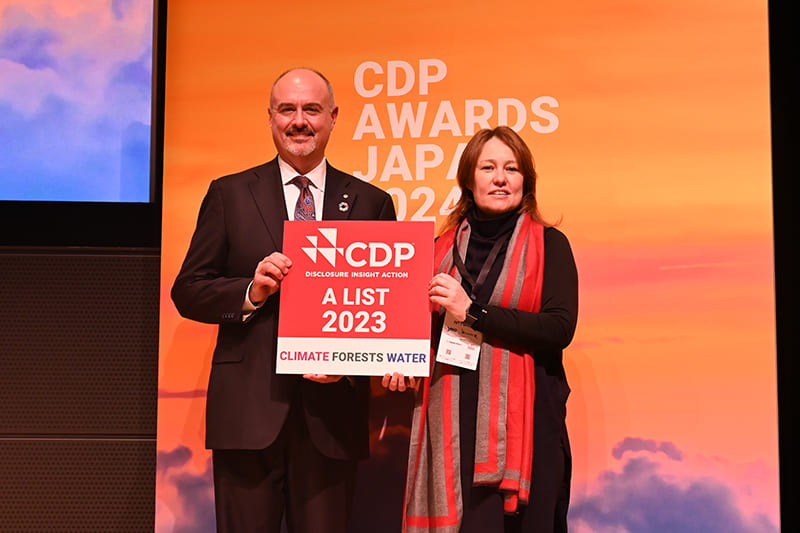
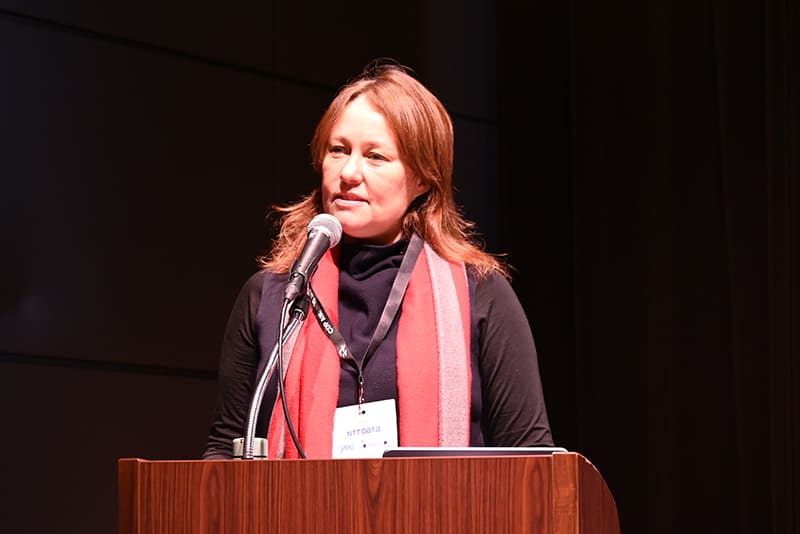
City of Tokyo
Among municipal governments, the Tokyo Metropolitan Government won the CDP’s Cities A List award, the highest score, for the third consecutive year since 2021.
“I’m very happy to know that our efforts to counter climate change and our focus on information disclosure have been highly rated,” Tokyo Gov. Yuriko Koike said in her speech.
Since Tokyo, one of the world’s biggest cities, is a major energy consumer, the Tokyo Metropolitan Government aims to mitigate the impact on the environment by achieving the international goal of limiting warming to 1.5 degrees Celsius under the slogans “2030 Carbon Half,” for halving carbon emissions by 2030, and “2050 Zero Emission Tokyo,” for achieving no net emissions of carbon dioxide by 2050.
The densely populated city of 14 million has skyscrapers and other buildings for offices and housing, and 70% of its emissions come from buildings. Yet solar panels are installed on merely 4% of them, Koike said.
To address this issue, a municipal ordinance taking effect next April will require new housing to have rooftop solar panels. Tokyo aims at generating more than 2 million kilowatts of solar power, tripling the current amount, by 2030, she said.
Innovative technologies will benefit the boost in solar power generation. Perovskite solar cells, a very thin, lightweight and flexible technology originating in Japan, will be installed in a wider range of spots. “Tokyo will help various innovations by, for instance, having such cells on each building,” Koike said.
Tokyo also promotes other types of renewable energy. In February, the metropolitan government inked a cooperation agreement with H2Global Foundation, which supports the production and use of green energy around the globe. Under the agreement, Tokyo will launch the country’s first hydrogen exchange in the city.
As for other global tie-ups, Tokyo has signed with the Australian state of New South Wales two memorandums of understanding, centering on such topics as the clean economy transition and hydrogen.
To financially support steps for tackling climate change, the metropolitan government plans to increase ESG bonds in the fiscal year starting in April to about ¥130 billion ($850 million), up ¥20 billion from a year earlier. Part of them will be “green/blue bonds,” which will finance not only green projects but also those for marine life.
“Now that we are facing a climate crisis, our actions will decide the future of Tokyo and Japan. So let’s achieve a sustainable future together,” she told the audience.
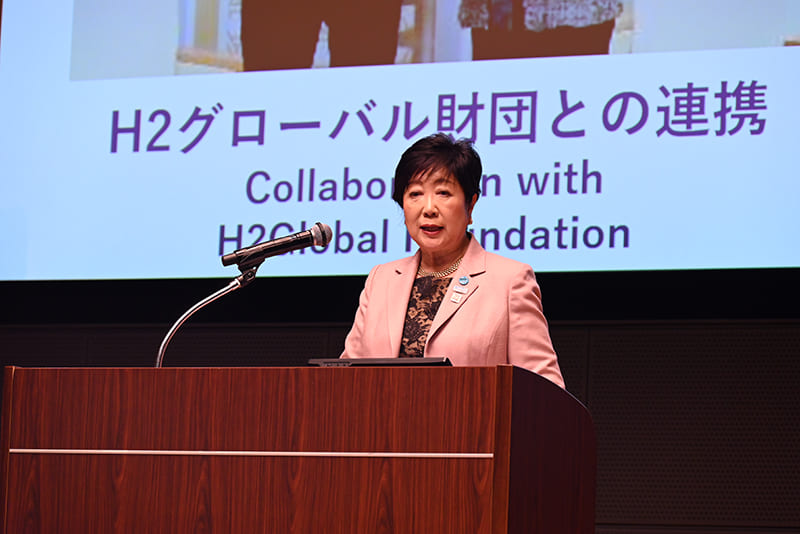
Data disclosure
In a panel discussion, experts and company executives talked about the importance of sustainability-related data disclosure and stakeholders’ rising attention to it.
Hiroshi Komori, a member of the International Sustainability Standards Board (ISSB), said it views standards as a communications tool between institutional investors and companies because investors verify disclosed information when making investment decisions and companies produce data for shareholders.
Global institutional investors need disclosed data, but that is not all they want to see, Komori said. “They want to know the process of the disclosure,” he said, adding that the process includes how companies produce data and what their board members discuss regarding the data.
“They want to see qualitative information that shows CEOs’ thoughts about the impacts that sustainability risks and opportunities may have on their future financial information,” he said. “Therefore, quantitative data is important for sustainability, but beyond that, qualitative information is important as well.”
Based on the international standards, the Sustainability Standards Board of Japan (SSBJ), established in 2022, plans to finalize the Japanese versions by the end of this year, Komori added.
Echoing Komori’s comments, Takeshi Kimura, special adviser to the board for Nippon Life Insurance Co., warned that companies should not forget the real purpose of the disclosure. “What companies need to do is to show how they contribute to developing a sustainable society and how they reinforce their abilities to solve environmental and social issues in the process,” he said. “It is very important whether they actively discuss long-term strategies and whether their corporate values improve by pursuing their KPIs (key performance indicators).”
Kimura also said that information disclosure is a necessary but not sufficient condition for companies to gain a strong reputation in capital markets. He said Japanese companies tend to think that disclosure is a goal in and of itself, but more important is what they disclose. “As for companies in Europe and the United States, the higher their CDP scores get, the higher their PBR (price-to-book ratio) and ROE (return on equity) tend to be. But unfortunately, there is no such correlation for Japanese firms,” Kimura continued. “What they disclose should be linked with their business strategies.”
Mikako Suzuki, a corporate officer in charge of ESG and risk management for Ricoh, agreed and said that companies must work on corporate disclosure in tandem with action plans. “Especially for climate change, if we decided on an aggressive goal but it was not practical, we would be criticized for ‘greenwashing,’” Suzuki said.
The provider of office products and IT management services, which made the A List in 2023 in the two categories of climate and water security, revised its environmental goals in March, moving up the goal of net-zero emissions under Scopes 1 and 2 to 2040 from its original 2050 target and strengthening Scope 3 reduction measures in its supply chain. Scope 1 emissions are from a company’s own facilities and vehicles, and Scope 2 emissions relate to the consumption of electricity and heat.
Yoshiko Ikeda, a senior vice president and head of the Sustainability Innovation Department at NTT Data Corp., pointed out the difficulties of disclosing Scope 3 data. The system integrator, which won CDP’s A score in climate, has three companies in its group and 200,000 workers in 50 countries. It has outsourced hardware and software to other companies in its supply chain, leading to 90% of the group’s emissions falling under Scope 3. Nonetheless, the group has announced that it aims for net-zero emissions from itself and throughout its supply chain by 2050.
Komori of the ISSB encouraged Japanese companies to continue to improve their sustainability disclosure, as an increasing number are preparing to do, with more than 100 Japanese companies making CDP’s A List in 2023. “I hope they will keep on improving the quality of their disclosure while checking the planned Japanese version of the global disclosure standards,” Komori told the audience.
Nippon Life’s Kimura reiterated the importance of action to reduce carbon emissions. “The main theme of investors’ engagement activities with companies will shift to ‘action’ from ‘disclosure,’” he said, adding that the main theme of last year’s PRI in Person global conference on responsible investment for institutional investors, held in Tokyo for the first time, was “Moving from commitment to action.”
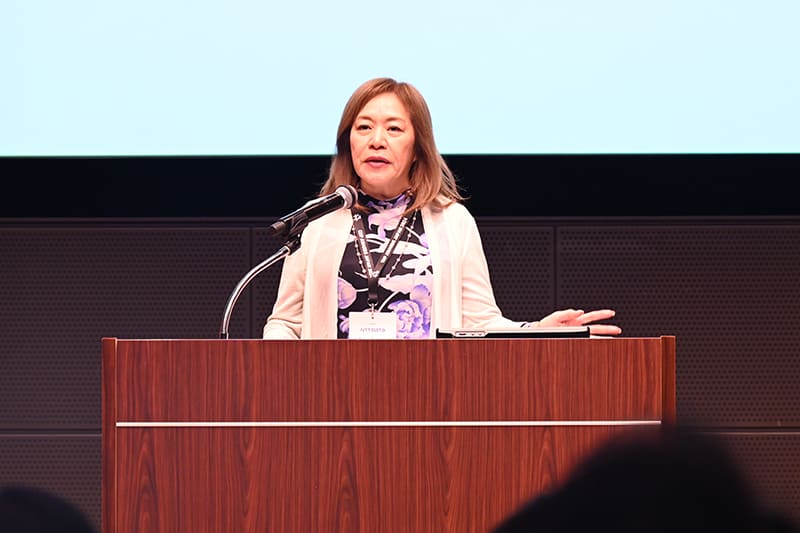
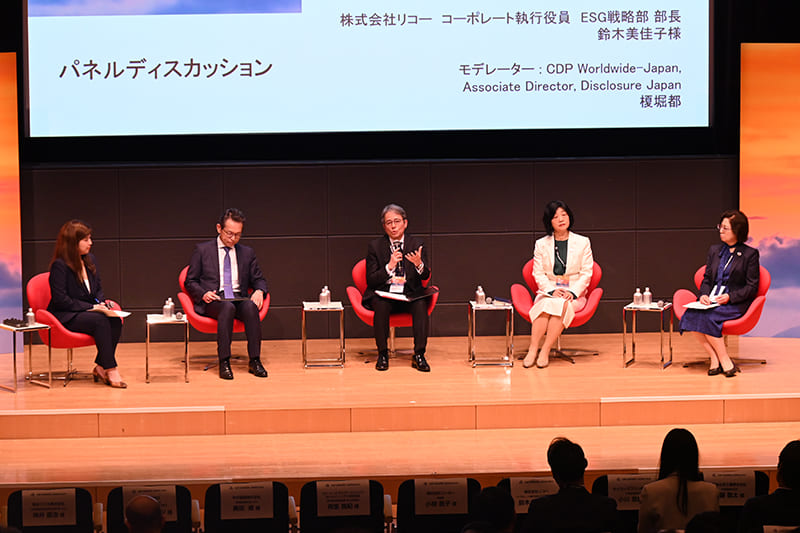
Plans lacking
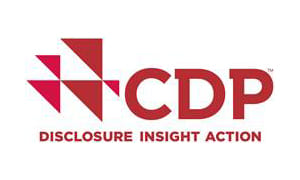
Kimura warned of a lack of specific action plans for transitioning. CDP last year said that among the 20,000 companies around the world that responded to its climate change questionnaire, only 81 — 0.4% — disclosed their transition plans.
Companies’ CDP scores draw scrutiny not only from their investors, but also their business partners. “Compared to a year earlier, the number of inquiries on our CDP scores doubled in the business year to March 2024,” Ricoh’s Suzuki said. “That means in business negotiations more companies are paying attention to how much we work on climate change issues and how much we disclose on the matter.”
As for how to prompt disclosures from suppliers, she said NTT Data is working with a wide range of companies in its supply chain and has classified them into six levels of disclosure to track their progress in each level.
For companies that need help understanding how to produce emissions data, NTT Data holds study sessions along with CDP. It also provides its suppliers with services to help make their emissions transparent. To create its platform for calculating emissions, called C-Turtle, NTT Data in 2022 became the first Japanese firm to sign a license agreement with CDP to use its global emissions database.
In conclusion, asked about what institutional investors require from corporate disclosures, Kimura told the audience, “I want you all to understand that investors have a strong sense of crisis.”
He said that less than 20% of the U.N.’s sustainable development goals for 2030 are currently on track. The 17 goals, adopted by the U.N.’s members in 2015, are related to poverty, inequality, climate change, and peace and justice.
“The status of the off-the-track agendas means to investors that their portfolios are under systematic risk,” Kimura said. “Please take action to achieve SDGs agendas. And please show us stories and plans toward the goals.”
The ISSB’s Komori said Japan’s planned finalization of its version of the global disclosure standards could be a model for other parts of Asia. “The expected adoption would make it possible to have a good impact on other countries, particularly South Korea, China, Singapore, Australia and ASEAN nations,” he said.
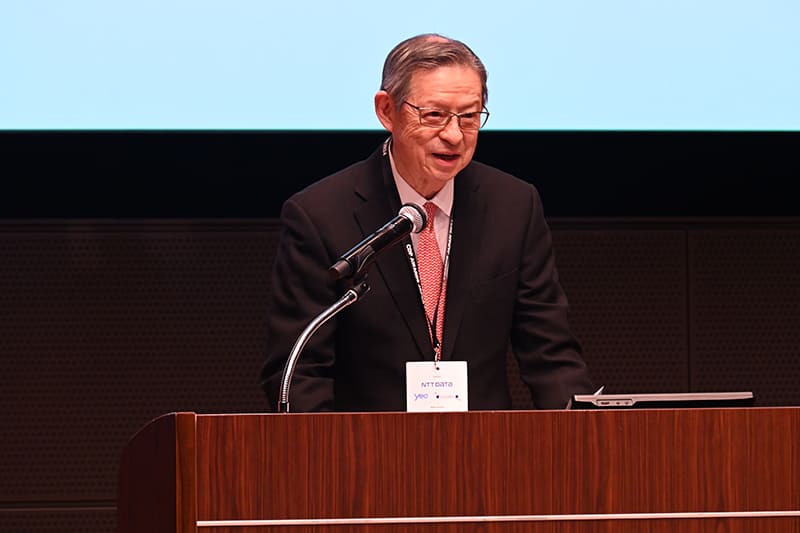
Aiming to highlight issues related to a sustainable society, The Japan Times gave its support to this event by becoming a media sponsor.


